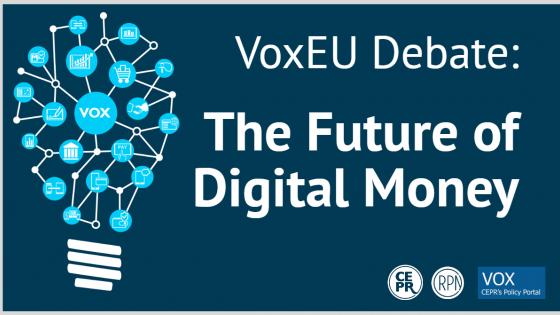New financial technologies are creating opportunities that could have far-reaching consequences (Casey et al. 2018). In the decade since Bitcoin launched, there has been an explosion of cryptocurrencies based on distributed ledger technology.1 In the eyes of their proponents, there could come a day when these decentralised forms of money will challenge the current dominance of traditional currencies issued by central banks.
Despite all the hype, the use of cryptocurrencies as means of payment remains insignificant. At the same time, other payments technologies are spreading quickly with the potential to be far more disruptive.
Visit the VoxEU debate on The Future of Digital Money here
Of course, the digitalisation of money and payments has a long history going back at least to the founding of Diners Club in 1950, the creation of Visa in 1958, and the introduction of the first debit card in 1966. But the advent of the internet in the 1990s brought the biggest changes, and made digital payments a daily reality for many consumers.
In advanced economies, traditional banks are the driving force behind major innovations in payments and the digitisation of money. By contrast, in emerging market and frontier economies, the catalysts are non-banks. In sub-Saharan Africa, mobile phone minutes form the basis for payments using systems such as M-Pesa; in China, account balances held at big tech firms like WeChat and Alipay account for a significant volume of transactions.2
This brings us to the recent announcement that Facebook is launching an effort to create a global currency ― Libra. As is the case with other cryptocurrencies, Libra hopes to become a mainstream currency at a global level. Like other stablecoins (and like a more traditional currency board), Libra’s value is tied to a basket of currencies.3 But, there is a big difference. Unlike all the digital monies that have come before it, Facebook has more than two dozen partners in creating Libra. These include large players in the payments world (including Visa, Mastercard, and Paypal) and venture capitalists (Andreesen Horowitz, Thrive Capital, and Union Square Ventures).
The debate about the future of money is not just about the creation new currencies. It is also about creating new methods to use existing currencies and existing units of accounts. JP Morgan’s creation of a ‘JPM Coin’, initially linked only to the US dollar and designed for inter-company payments as well as settlement of market transactions, is just one example.
Governments and international organisations are monitoring these innovations in money and payments technology intently. Many see opportunities for improving the efficiency of finance and a mechanism to promote financial inclusion.4 At the same time, there are clear concerns about the impact these changes have on the stability of the financial system.
VoxEU and CEPR are launching an online debate on the future of digital money to foster a conversation among academics and policymakers about the costs and benefits of different innovations and the future scenarios for digital money. Among the many questions we hope to address with this debate are the following: Will the use of private digital currencies (such as Libra) become widespread? Is there a role for a global digital currency? As legacy monies disappear, what will happen to the role of central banks in the payment systems? How will financial institutions, in particular banks, evolve as these innovations become ubiquitous? Will there be new channels for the transmission and amplification of economic and financial shocks both within and across borders? And how should we regulate tech companies that become large players in the payments system and financial markets?
The debate starts with four contributions that introduce a first set of relevant issues, more contributions will follow over the coming weeks. You can read all the other contributions to the debate here.
References
Casey, M, J Crane, G Gensler, S Johnson, N Narula (2018), The Impact of Blockchain Technology on Finance: A Catalyst for Change, Geneva Report on the World Economy 21, ICMB and CEPR.
International Monetary Fund (2019), Fintech: The Experience so Far.
Endnotes
[1] Some of the popular internet sites where prices of cryptocurrencies are listed report around 2,500 different active cryptocurrencies (https://coinmarketcap.com or https://www.coinlore.com/all_coins).
[2] The share of adults with mobile accounts is as high as 21% and the value of transactions represents 10% of GDP (IMF 2019).
[3] For details on Libra, see https://libra.org/en-US/white-paper/
[4] See https://www.imf.org/en/News/Articles/2018/11/13/sp111418-winds-of-change-the-case-for-new-digital-currency



